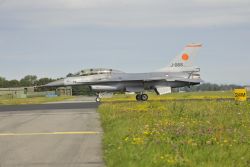
The Orange Jumper is ready for take off
In the framework of the NTP project, Fighter Aircraft Robust Power Management (FARPM), the National Aerospace Laboratory (NLR), in collaboration with and commissioned by the Royal Netherlands Air Force, conducted a flight test with the Orange Jumper (F-16), during which the demo profile was flown.
For the Fighter Aircraft Robust Power Management project, NLR uses calculation models to study the effects that energy management and distribution has on the operational deployability of fighter jets.
In future, fighter jets, like the F-16, will demand more electrical power. It is as yet unknown how this generated energy will be internally distributed throughout the system, nor what consequences this could have for operational capability, airworthiness, maintenance and lifespan. To research this, NLR set up the National Technology Programme (NTP), which is funded by the Netherlands Ministry of Defence until April 2012, after which, during the subsequent four years, the NTP will be a Ministry of Defence research program.
Under the auspices of the Dutch and US governments, during the NTP project, a Program Agreement is to be established in the field of energy management and distribution in fighter jets, with collaborative research being conducted with the US Air Force Research Laboratories (AFRL) at Wright-Patterson AFB in Dayton, Ohio.
Two flight tests were conducted, during which a measurement set was obtained that comprises the entire maneuverability capacity of the aircraft, as, during the demo, standard maneuvers were flown to the limit. This measurement data will be used to verify and validate the calculation models, which are under development at NLR.
The flight tests generated interest from an unexpected non-ally; that is, shortly before the Orange Jumper was set to depart on the first flight test from Leeuwarden Air Base, two unannounced Russian TU-95 Bears were detected approaching Dutch airspace. Two ‘Quick Reaction Alert’ F-16’s of the Royal Netherlands Air Force were immediately scrambled to intercept the Bears, which resulted in the flight tests starting 20 minutes late. It was the fourth time this year that Russian reconnaissance planes threatened to enter Dutch airspace.
NLR is extremely pleased with the outstanding collaborative efforts undertaken during the tests conducted with the Royal Netherlands Air Force and also with the resulting comprehensive data set. NLR is currently analyzing this data. Based on these findings, NLR will make recommendations to the Ministry of Defense.


